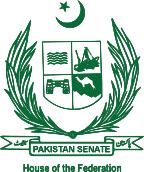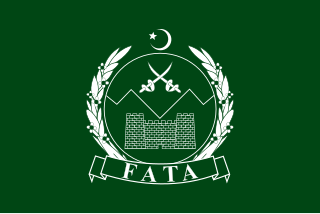Related Research Articles

The Politics of Pakistan takes place within the framework established by the constitution. The country is a federal parliamentary republic in which provincial governments enjoy a high degree of autonomy and residuary powers. Executive power is vested with the national cabinet which is headed by Prime Minister of Pakistan, who works with the bicameral parliament and the judiciary. Stipulations set by the constitution provide a delicate check and balance of sharing powers between executive, legislative, and judicial branches of the government.

A veto is a legal power to unilaterally stop an official action. In the most typical case, a president or monarch vetoes a bill to stop it from becoming law. In many countries, veto powers are established in the country's constitution. Veto powers are also found at other levels of government, such as in state, provincial or local government, and in international bodies.

The Constitution of Pakistan, also known as the 1973 Constitution, is the supreme law of Pakistan. The document guides Pakistan's law, political culture, and system. It sets out the state's outline, the fundamental rights of the population, the state's law and orders, and also the structure and establishment of the institutions and the armed forces. Drafted by the government of Zulfikar Ali Bhutto, with additional assistance from the country's opposition parties, it was unanimously approved by the 5th Parliament on 10 April and ratified on 14 August 1973. The first three chapters establish the rules, mandate, and separate powers of the three branches of the government: a bicameral legislature; an executive branch governed by the Prime Minister as chief executive; and an apex federal judiciary headed by Supreme Court. The Constitution designates the President of Pakistan as a ceremonial Head of State who is to represent the unity of the state. The first six articles of the constitution outline the political system as federal parliamentary republic system; as well as Islam as its state religion. The Constitution also encapsulates provisions stipulating the legal system's compliance with Islamic injunctions contained in the Quran and Sunnah.

The president of Pakistan is the head of state of the Islamic Republic of Pakistan. The president is the nominal head of the executive and the supreme commander of the Pakistan Armed Forces. The presidency is a ceremonial position in Pakistan. The president is bound to act on advice of the prime minister and cabinet. Asif Ali Zardari is the current president since 10 March 2024.

The prime minister of Pakistan is the head of government of the Islamic Republic of Pakistan. Executive authority is vested in the prime minister and his chosen cabinet, despite the president of Pakistan serving as the nominal head of executive. The prime minister is often the leader of the party or the coalition with a majority in the lower house of the Parliament of Pakistan, the National Assembly where he serves as Leader of the House. Prime minister holds office by virtue of their ability to command the confidence of the National Assembly. The prime minister is designated as the "chief executive of the Islamic Republic".

The Senate of Pakistan, constitutionally the House of the Federation, is the upper house of the bicameral Parliament of Pakistan. As of 2023, It has a maximum membership of 96, of which 92 are elected by the provincial legislatures using single transferable vote; four represent the federal capital. Members sit for terms lasting six years, with half of the house up for election every three years. Unlike the National Assembly, the Senate is a continuing chamber and hence not subject to dissolution.

The National Assembly of Pakistan is the lower house of the bicameral Parliament of Pakistan, with the upper house being the Senate. As of 2023, the National Assembly has a maximum membership of 336, of which 266 are directly elected by an adult universal suffrage and a first-past-the-post system to represent their respective constituencies, while 60 are elected on reserved seats for women and religious minorities from all over the country. Members hold their seats for five years or until the house is dissolved by the President on the advice of the Prime Minister. The house convenes at the Parliament House, Red Zone, Islamabad.

The Parliament of Pakistan is the supreme legislative body of the Islamic Republic of Pakistan. It is a bicameral federal legislature, composed of the President of Pakistan and two houses: the Senate and the National Assembly. The president, as head of the legislature, has the power to summon or prorogue either house of the Parliament. The president can dissolve the National Assembly, only on the Prime Minister's advice.

The Federally Administered Tribal Areas, commonly known as FATA, was a semi-autonomous tribal region in north-western Pakistan that existed from 1947 until being merged with the neighbouring province of Khyber Pakhtunkhwa in 2018 through the Twenty-fifth amendment to the constitution of Pakistan. It consisted of seven tribal agencies (districts) and six frontier regions, and were directly governed by the federal government through a special set of laws called the Frontier Crimes Regulations.
Amending the Constitution of India is the process of making changes to the nation's fundamental law or supreme law. The procedure of amendment in the constitution is laid down in Part XX of the Constitution of India. This procedure ensures the sanctity of the Constitution of India and keeps a check on arbitrary power of the Parliament of India.
The Constitution of 1962 was the fundamental law of Republic of Pakistan from 8 June 1962 until martial law was declared in 25 March 1969. It was abrogated on 25 March 1969 by President Yahya Khan.
The Eighteenth Amendment of the Constitution of Pakistan was passed by the National Assembly of Pakistan on April 8, 2010, removing the power of the President of Pakistan to dissolve the Parliament unilaterally, turning Pakistan from a semi-presidential to a parliamentary republic, and renaming North-West Frontier Province to Khyber Pakhtunkhwa. It also gave self-governing, legislative and financial autonomy to provincial authorities. The package was intended to counter the sweeping powers amassed by the presidency under former presidents General Pervez Musharraf and General Muhammad Zia-ul-Haq and to ease political instability in Pakistan. The bill reversed many infringements on the Constitution of Pakistan over several decades by its military rulers. The amendment bill was passed by the Senate of Pakistan on April 15, 2010 and it became an act of parliament when President Asif Ali Zardari signed the bill on April 19, 2010. It was the first time in Pakistan's history that a president relinquished a significant part of his powers willingly and transferred them to parliament and the office of the prime minister.

The Twenty-fourth Amendment of the Constitution of India, officially known as The Constitution Act, 1971, enables Parliament to dilute Fundamental Rights through Amendments of the Constitution. It also amended article 368 to provide expressly that Parliament has power to amend any provision of the Constitution. The amendment further made it obligatory for the President to give his assent, when a Constitution Amendment Bill was presented to him.
The Fifteenth Amendment bill to the Constitution of Pakistan was passed by National Assembly of Pakistan on 28 August 1998. It was then moved to the Senate, where it was never passed.
Twenty-first Amendment to the Constitution of Pakistan was passed by both the National Assembly of Pakistan and Senate of Pakistan on January 6, 2015, and received the assent of the President on January 7, 2015. The Bill amended the Article 175 and the First Schedule of the Constitution. It also has a self-contained sunset clause, which causes the amendments to expire on January 7, 2017.
The Twenty-second Amendment of the Constitution of Pakistan, officially known as the Constitution Act, 2016, sets to amend the procedure for the appointment, qualifications and other prerequisites for the chief election commissioner (CEC) and four members of the Election Commission of Pakistan (ECP).

The Twenty-fifth Amendment to the Constitution of Pakistan was passed by the Parliament of Pakistan and the Khyber Pakhtunkhwa Assembly in May 2018. Under the amendment, the Federally Administered Tribal Areas (FATA) and Provincially Administered Tribal Areas (PATA) are to be merged with the province of Khyber Pakhtunkhwa (KP).
The Constitution Act, 2017 was a proposed amendment to the Constitution of Pakistan which aimed to restore military courts. The amendment would be an extension of the expired Twenty-first Amendment to the Constitution of Pakistan.

The One Hundred and Second Amendment of the Constitution of India, officially known as the Constitution Act, 2018, granted constitutional status to the National Commission for Backward Classes (NCBC).
The Twenty-Sixth Amendment to the Constitution of Pakistan, known officially as the Constitution Act, 2024, is an amendment to the Constitution of Pakistan passed by Parliament in a 'marathon session' between 20–21 October, 2024. Coming into force with Presidential assent the same day. The amendment contains 27 clauses, which effect change in judicial, parliamentary and executive frameworks: modifying aspects of judicial appointments, judicial powers, and adjusting legal procedures. These include the removal of the controversial suo motu prerogative of the Supreme Court, the capping the Chief Justice of Pakistan's (CJP) tenure to three-years, the reconstitution the Judicial Commission of Pakistan (JCP) to sit on judicial appointments, the formation of a separate constitutional bench in the Supreme Court, the limiting of the ability of courts to question the recommendations from Cabinet to the President or Prime Minister, the increasing of Parliamentary oversight, and the establishment of a 12-member Special Committee in Parliament with proportional representation to nominate the CJP from the three most-senior judges in the court.
References
- ↑ Ghauri, Irfan (2017-03-31). "Military courts resume for two years after president gives assent". The Express Tribune . Pakistan. Retrieved 2018-05-29.